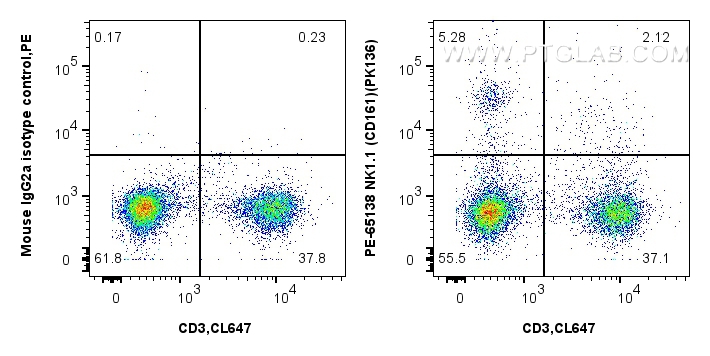验证数据展示
经过测试的应用
| Positive FC detected in | mouse splenocytes |
推荐稀释比
| 应用 | 推荐稀释比 |
|---|---|
| This reagent has been tested for flow cytometric analysis. It is recommended that this reagent should be titrated in each testing system to obtain optimal results. | |
| Sample-dependent, Check data in validation data gallery. | |
发表文章中的应用
| FC | See 2 publications below |
产品信息
PE-65138 targets NK1.1 (CD161) in FC applications and shows reactivity with mouse samples.
| 经测试应用 | FC Application Description |
| 文献引用应用 | FC |
| 经测试反应性 | mouse |
| 文献引用反应性 | mouse |
| 免疫原 | NK-1+ cells from mouse spleen and bone marrow 种属同源性预测 |
| 宿主/亚型 | Mouse / IgG2a, kappa |
| 抗体类别 | Monoclonal |
| 产品类型 | Antibody |
| 全称 | killer cell lectin-like receptor subfamily B member 1A |
| 别名 | Klrb1a, CD161a, PK136, Nkrp1a, NK1.1 |
| GenBank蛋白编号 | BC120707 |
| 基因名称 | NK1.1 |
| Gene ID (NCBI) | 17057 |
| RRID | AB_2883920 |
| 偶联类型 | PE Fluorescent Dye |
| 最大激发/发射波长 | 496 nm, 565 nm / 578 nm |
| 形式 | Liquid |
| 纯化方式 | Affinity purification |
| UNIPROT ID | P27811 |
| 储存缓冲液 | PBS with 0.09% sodium azide and 0.5% BSA , pH 7.3 |
| 储存条件 | Store at 2-8°C. Avoid exposure to light. Stable for one year after shipment. |
背景介绍
NK1.1 (CD161), also known as KLRB1 or NKR-P1A, is a type II transmembrane C-type lectin-like receptor and is expressed on the cell membrane as disulfide-linked homodimer (PMID: 8077657). It is expressed by the majority of NK cells and subsets of peripheral T cells, including both CD4+ and CD8+ T cells, and is expressed preferentially on adult T cells with a "memory" antigenic phenotype (PMID: 8077657; 22566826). Expression of CD161 correlates with the cytotoxic function of CD16+ NK cells, and ligation of CD161 with its ligand LLT1 inhibits NK cell cytotoxicity and cytokine secretion (PMID: 29686665).
实验方案
| Product Specific Protocols | |
|---|---|
| FC protocol for PE NK1.1 (CD161) antibody PE-65138 | Download protocol |
| Standard Protocols | |
|---|---|
| Click here to view our Standard Protocols |
发表文章
| Species | Application | Title |
|---|---|---|
Nat Nanotechnol A bispecific nanosystem activates endogenous natural killer cells in the bone marrow for haematologic malignancies therapy | ||
Adv Sci (Weinh) EGR3 Inhibits Tumor Progression by Inducing Schwann Cell-Like Differentiation |
